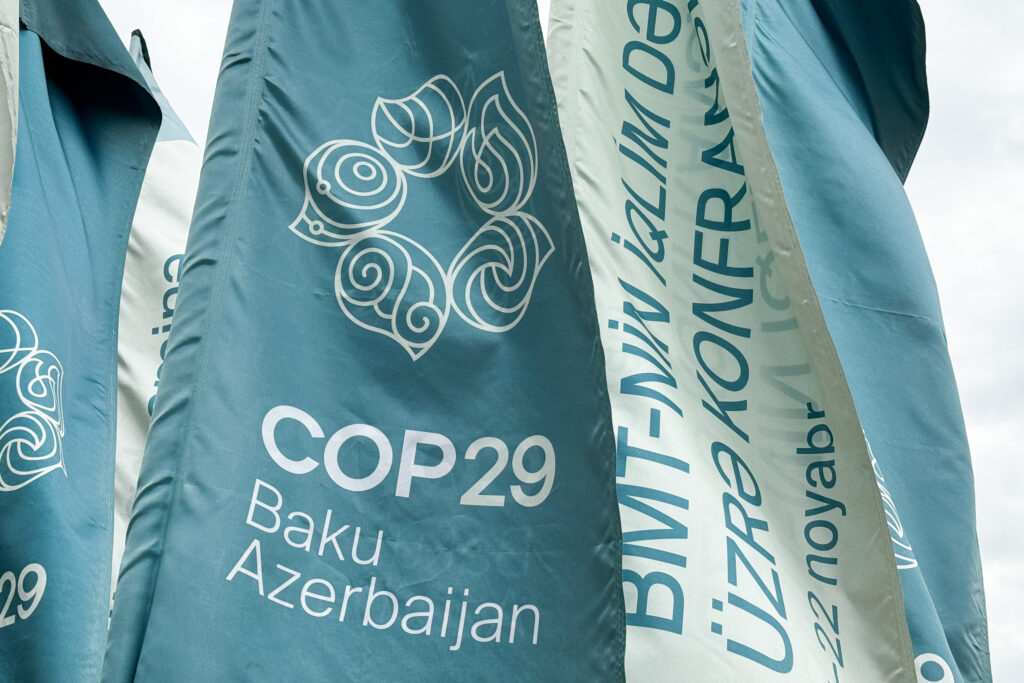From our collaborating partner, Living on Earth, public radio’s environmental news magazine, an interview by Jenni Doering with Bob Berwyn, who covers climate science and the UN Intergovernmental Panel on Climate Change for Inside Climate News.
As the world gears up for the United Nations climate treaty summit, COP29 in Azerbaijan, a series of scientific reports warns of a potential 3 degrees Celsius rise in temperatures above pre-industrial levels.
This projection starkly contrasts with the 1.5 degrees Celsius target set by the Paris Climate Agreement in 2015.
Experiencing 1.3 degrees of warming, we face more severe storms, heatwaves, and rising sea levels.
Achieving the Paris target requires halving global emissions by 2030, a goal yet unmet.
The ongoing use of fossil fuels and forest loss has led to record-high greenhouse gas emissions, with treaty plans only aiming for a 2.6 percent reduction.
Bob Berwyn, reporting on climate negotiations for Inside Climate News, outlines the challenges of meeting the Paris Agreement goals. This interview has been condensed for clarity.
BOB BERWYN: We now need annual reductions of about 7.5 percent, a target we’ve yet to approach. Each year without progress makes the necessary cuts more substantial. Notably, UN officials have acknowledged that the 1.5-degree target might be unattainable.
JENNI DOERING: The 2.5 percent emissions reduction projected by 2030 poses questions about which countries are leading the charge.
BERWYN: Europe stands out, having cut emissions by approximately 32.5 percent since 1990, aiming for a 40 to 50 percent reduction by 2030. They’ve even considered more ambitious targets.
The U.S. has reduced emissions by about 17 percent from 1990 levels, peaking in 2007. While some developed nations make progress, it’s insufficient for global goals. The EU, U.S., and China represent significant global emissions. Under the Paris Agreement, countries aren’t required to reduce emissions equally. Developed countries, historically the largest polluters, must make significant cuts first, per the UN Framework Convention on Climate Change.
DOERING: Given the gap between current emissions and the 1.5-degree target, some might question the UNFCCC’s relevance. What’s your perspective?
BERWYN: Despite challenges, the UNFCCC process led to the Paris Agreement, with 198 countries acknowledging its importance. At COP28, transitioning away from fossil fuels was addressed—a significant step. Studies suggest emissions might be higher without ongoing global talks since the 1990s.
Even after the Kyoto Protocol’s collapse, Europe pursued its goals, showcasing persistence’s benefits. However, the climate crisis demands urgency, and settling for a 2-degree target could delay necessary actions.
DOERING: One report suggests we may exceed the 1.5-degree limit. What are the implications?
BERWYN: Scientific discussions continue regarding impacts at different warming levels. Small temperature increases, such as between 1.5 and 1.6 degrees, can significantly worsen weather events. As warming increases incrementally, these effects are magnified.
Every fraction of a degree matters, so stopping warming at 1.6 or 1.7 degrees, if not 1.5, remains critical.
DOERING: With the U.S. presidential election approaching, how might international climate efforts be affected?
BERWYN: Reactions vary globally. European allies, sharing climate policies, are concerned about U.S. election outcomes. A Republican win might increase emissions, while a Democratic win could continue reductions.
Some regions, like parts of Africa, feel less impacted by U.S. policies, viewing domestic strategies as minimal. The world is accustomed to shifts in U.S. climate policy, as seen with the Paris Agreement and Kyoto Protocol.
The global climate initiative will persist, though potentially delayed by U.S. non-participation. The world recognizes the urgency of transitioning beyond fossil fuels, risking U.S. isolation if it lags.
DOERING: Bob Berwyn with Inside Climate News, based in Austria, thank you for your insights.
BERWYN: You’re welcome.
Original Story at insideclimatenews.org
